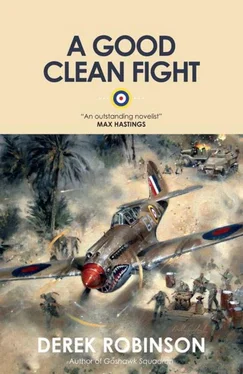“Three,” said Lampard. “I can see three. There were four. Where’s the other gone?”
“Maybe it went back,” Dunn said. “For God’s sake, let’s get down.” The three armored cars were at the extreme limit of the Italians’ range, but spent rounds were plopping into the sand and Dunn felt conspicuous.
“Why should it go back?” Lampard was searching the scene through binoculars. “Makes no sense. Tell you what makes sense. Outflanking makes sense. Those three keep us busy while number four sneaks round behind us and duffs us up.”
“That’s all salt marsh,” Dunn said, waving toward the left. “So he can’t get through there, can he?”
Abruptly all firing ceased. The armored cars had pulled back. For a while both sides stood and looked at each other through air that twitched and shivered and baked.
“Let’s get out of here,” Dunn said. “What are we waiting for?”
“What are they waiting for?”
“The heavy brigade. Stukas. Who knows? Tanks. Artillery.”
Lampard made one last search through his field glasses, knowing that every second was risky and enjoying every second of risk. “All right, let’s go,” he said, but he took a final look at the wrecked Storch. Nose down and tail high, it made a silhouette like an English market cross. Someone tumbled from the cockpit and fell out of sight. Dead or alive? Probably alive. Less than totally satisfying, that. Pity the kite hadn’t burned. Nothing beats a nice pillar of flame. His jeep came by and he swung into the front seat.
Dunn was relieved when the three armored cars made no attempt to follow. He guessed that the sudden presence of a Bofors on an ordinary-looking truck had alarmed and discouraged them. Now the only danger lay in covering the next five or six miles of patchy going before the Italians could whistle up an air strike; after that it was all hard, flat desert where you could really put your foot down and sprint for home. A dull thudding pounded the air. At first Dunn thought it was a flat tire beating itself to bits, but the truck ran smoothly. More thudding sounded, then a pause, then a long and gloomy crump. “Jesus!” he said.
His driver pointed. “Wireless truck,” he said. Black smoke, rich as oil, was gushing into the sky.
A fold in the land hid the truck from view: the same fold that, earlier, had concealed the Storch from Lampard’s jeep. Dunn knew his driver was right. Only the wireless truck could have burned like that. Now they knew where the fourth armored car had gone, although how it got there was a mystery. The armed truck rounded the salt marsh and they saw more of the burning vehicle. It was gripped by vivid red flames that jumped and swayed like dancers, all wrong for the desert, far too lively; nothing should be so wildly active in such stifling heat. Another crump shook the wireless truck, or perhaps that was just the shuddering of the afternoon air. Fresh smoke boiled up, thrusting the old smoke higher.
Lampard’s jeep got there first. He stopped for ten seconds to check out the area, seeking any trace of the enemy. Then he made a fast circuit of the burning truck. Two men came out of a patch of waist-high scrub. They were Corporal Pocock and Trooper Smedley.
“Where’s the Alfa?” Lampard demanded. “Where’s Davis?”
“Gone.” Pocock pointed eastward. “And bloody lucky to do it.”
“Anyone hurt?”
“Mr. Waterman’s in there.” Pocock looked at the wireless truck. Only its shell was left, looking curiously frail through the flames. As the wheels burned out, the chassis settled, like an animal making itself comfortable.
“Jump in,” Lampard said. Dunn’s truck had arrived. “Time to beat it for home, I think.” He got out and went over to Dunn. “Looks like Tony got the chop,” he said.
Dunn was beyond caring. All he knew was that he was sitting next to the biggest smoke signal in Libya. “Too bad,” he said. When Lampard remained looking at him, he added: “Could have been you or me, I suppose.”
“More likely you or I.”
Dunn stared. “Come again?”
“You or I, not you or me. Verb to be takes the nominative, not the accusative.” Lampard nodded in approval of himself.
“Drive on!” Dunn said loudly. Death he could take. Death and grammar, no.
If he had used his brains, Schramm would have crawled into the shade of the Storch’s wide wings and waited to be rescued. Instead, he got to his heavily bandaged feet and tried to walk to the headquarters of Jalo garrison in order to tell them to radio Barce airfield. It would be a simple message, merely informing Hoffmann where to find (and destroy) the British patrol, and so Schramm thought it must be a simple walk. That wasn’t sensible, but Schramm was sick and tired of acting sensibly. He had acted sensibly when he got captured, and when he escaped, and when he walked across the Jebel, and when he acquired the Storch; and look what acting sensibly had got him: an escort of flies. He stumbled bravely in the wrong direction. When he reached a palm tree he clung to it and had a rest before aiming for the next palm tree. He had no hat. He walked with his mouth wide open, wheezing the superheated air over his bone-dry tongue.
When the Italian armored cars were sure the British patrol had gone, they checked out the Storch and extracted the body of the pilot. Someone noticed blurred footprints and quite quickly the Italians found Schramm, who had almost completed a full circle.
At Jalo hospital the doctor didn’t even try to understand his croaking and grunting. When Schramm had sipped a little milk, some of his voice returned, but his Italian was jumbled and the doctor knew little German. Schramm kept getting out of bed and trying to use the telephone. Eventually the doctor gave him a swift injection when he wasn’t looking and Schramm fell peacefully asleep, which gave the doctor a chance to examine his feet. Schramm’s feet greatly impressed the doctor.
Lampard and Dunn raced back along their own tracks and found the Alfa and the other jeep waiting at the point where the patrol had turned off to hunt the Storch. There was no pause, no discussion. Lampard waved at Gibbon, pointed south, and the patrol began the long sprint across the serir to Kufra.
Serir was the best going in the Sahara. It was a fine, smooth, gravel plain and it stretched without bump or blemish from horizon to horizon. It was so good that you could almost take your hands off the wheel. Unless a mirage appeared there was nothing to see, nothing to look at except the other vehicles barreling across the flat, empty, beautiful landscape. The patrol loved it. Every hour took them another fifty miles from the enemy. The racing air hustled around their bodies and for the first time in many days they were almost cool.
Near the end of the serir the Alfa began to complain. Its exhaust pumped smoke and the engine developed a painful clatter. A couple of miles later there was a small explosion and the engine dumped its oil on the desert. One of the trucks took the Alfa in tow, but within minutes that truck had a puncture. As soon as they restarted, a jeep stopped. The engine was healthy but the clutch had quit. Lampard looked at the sun. Kufra was still a good hundred miles away, with some sharp rocks and then a nasty little neck of the Sand Sea to be crossed. He glanced at his driver. The man had eyes like a lizard with a hangover. Lampard had been sharing the driving. He knew how the man felt. “We’ll stop here,” Lampard announced.
Nobody talked much. The cooks got cracking. The patrol was a long way from the enemy, but all the double-Vickers were cleaned just the same. The loads were checked for leaky water tins or jerricans. The fitters peered into engines that were still too hot to touch, or squatted by the tires, looking for tomorrow’s trouble.
Читать дальше












